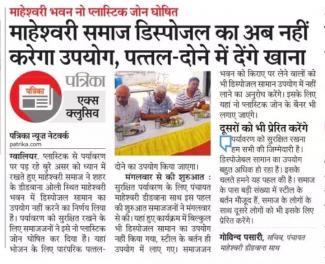
इस समाचार को हिन्दी में आगे पढ़े....
Researchers at Indian Institute of Technology (IIT) Guwahati has worked on out-of-the-box ideas that can help prevent or reduce short-term memory losses associated with Alzheimer’s disease.
The research team was headed by Prof. Vibin Ramakrishnan, Professor, Department of Biosciences & Bioengineering, IIT Guwahati, and Prof. HarshalNemade, Professor, Department of Electronics and Electrical Engineering, IIT Guwahati. They studied the neurochemical principles of Alzheimer’s, and explored new ways to prevent accumulation of neurotoxic molecules in the brain that are associated with short-term memory loss.
The IIT Guwahati team reports interesting methods such as application of low-voltage electric field, and the use of ‘trojan peptides’ to arrest aggregation of neurotoxic molecules in the brain. The scientists are assisted by research scholars Dr. Gaurav Pandey and Mr. JahnuSaikia in their work. The results of their studies have been published in reputed journals such as ACS Chemical Neuroscience, RSC Advances of Royal Society of Chemistry, BBA and Neuropeptides.
The development of a cure for Alzheimer’s disease assumes importance India as it has the third highest number of Alzheimer’s patients in the world, after China and US, with more than four million people falling prey to the memory loss associated with it. While current treatments only alleviate some of the symptoms of the disease, there is no disruptive therapeutic approach yet that can treat the underlying causes of Alzheimer’s.
“Approximately hundred potential drugs for treatment of Alzheimer’s disease have failed between 1998 and 2011, which shows the gravity of the problem,” says Dr. Ramakrishnan, who participates in worldwide efforts at finding cures for the disease.
A defining hallmark of Alzheimer’s is the accumulation of amyloid beta peptides in the brain. Dr. Ramakrishnan and Dr. Nemade seek methods to reduce the accumulation of these peptides, in order to arrest the progression of Alzheimer’s.
In 2019, the IIT Guwahati scientists found that application of a low-voltage, safe electrical field can reduce the formation and accumulation of toxic neurodegenerative molecules that cause short-term memory loss in Alzheimer’s disease. They found that external electric/magnetic field modulates the structure of these peptide molecules, thereby preventing aggregation.
“Upon exposure to electric field, we could retard the degeneration of nerve cells to an extent of 17–35%. Objectively, this would translate to about 10 years delay in the onset of the disease”, says Dr. Ramakrishnan.
Working further in this area, the scientists explored the possibility of using ‘Trojan peptides’ to arrest aggregation of these neurotoxic molecules. The idea of using ‘Trojan peptide’ comes from mythological “Trojan Horse” used as subterfuge by the Greeks in the battle of Troy. The researchers have designed Trojan peptides by adopting a similar approach of ‘deceit’ to impede the aggregation of the amyloid peptide, arrest the formation of toxic fibrillar assemblies, and reduce poisoning of nerve cells that leads to memory loss.
“Our research has provided a different path that may extend the onset of the Alzheimer’s disease. However, it would take testing in animal models and clinical trials before bringing in such new therapeutic approaches into human treatment” say project coordinators, Dr. Ramakrishnan and Dr. Nemade.
आईआईटी गुवाहाटी ने अल्जाइमर के कारण भूलने की आदत रोकने के नये तरीकों का पता लगाया
भारतीय प्रौद्योगिकी संस्थान (आईआईटी) गुवाहाटी के शोधकर्ताओं ने ऐसी सृजनात्मक सोच पर काम किया है जो अल्जाइमर रोग से जुड़ी भूलने की आदत को रोकने या कम करने में मदद कर सकते हैं।
अनुसंधान दल का नेतृत्व बायोसाइंसेज एंड बायोइंजीनियरिंग विभाग, आईआईटी गुवाहाटी के प्रोफेसर वाइबिन रामकृष्णन, इलेक्ट्रॉनिक्स और इलेक्ट्रिकल इंजीनियरिंग विभाग, आईआईटी गुवाहाटी केप्रोफेसर हर्षल नेमाड़े ने किया। उन्होंने अल्जाइमर के न्यूरोकेमिकल सिद्धांतों का अध्ययन कियाऔर मस्तिष्क में न्यूरोटॉक्सिक अणुओं का संचय रोकने के नए तरीकों की खोज की जो भूलने की आदत से जुड़े हैं।
आईआईटी गुवाहाटी टीम ने कम वोल्टेज वाले विद्युत क्षेत्र के अनुप्रयोग और मस्तिष्क में न्यूरोटॉक्सिक अणुओं को एकत्र होने से रोकने के लिए ‘ट्रोजन पेप्टाइड्स’के उपयोग जैसे दिलचस्प तरीकों की जानकारी की। वैज्ञानिकों को उनके कार्यों में शोध छात्र डॉ. गौरव पांडे और श्री जाह्नु सैकियाने सहायता की। उनके अध्ययनों के परिणाम एसीएस केमिकल न्यूरोसाइंस, रॉयल सोसाइटी ऑफ केमिस्ट्री के आरएससी एडवांस, बीबीए और न्यूरोपेप्टाइड जैसी प्रतिष्ठित पत्रिकाओं में प्रकाशित हुए हैं।
अल्जाइमर रोग का इलाज भारत में विकसित करने का महत्व है क्योंकि चीन और अमेरिका के बाद, दुनिया में अल्जाइमर के रोगियों की तीसरी सबसे बड़ी संख्या भारत में है, भारत में 40 लाख से अधिक लोग अल्जाइमर से जुड़ी भूलने की आदत के शिकार हैं। वर्तमान उपचारों में केवल रोग के कुछ लक्षण कम हो जाते हैं, फिर भी चिकित्सा संबंधी कोई ऐसी विध्वंसक पद्धति नहीं है जो अल्जाइमर के अंतर्निहित कारणों का इलाज कर सकती हो।
डॉ. रामाकृष्णन का कहना है, "अल्जाइमर रोग के इलाज के लिए लगभग सौ संभावित दवाएं 1998 और 2011 के बीच विफल रही हैं, जो समस्या की गंभीरता को दर्शाता है।"
अल्जाइमर का एक निर्धारक हॉलमार्क मस्तिष्क में एमीलॉइड बीटा पेप्टाइड्स का संचय है। डॉ. रामाकृष्णन और डॉ.नेमाड़े ने अल्जाइमर की प्रगति को रोकने के लिए इन पेप्टाइड्स के संचय को कम करने के तरीकों की तलाश की।
2019 में, आईआईटीगुवाहाटी के वैज्ञानिकों ने पाया कि कम-वोल्टेज, सुरक्षित विद्युत क्षेत्र के अनुप्रयोग से विषाक्त न्यूरोडीजेनेरेटिव अणुओं का निर्माण और संचय कम हो सकता है जो अल्जाइमर रोग में भूलने का कारण बनते हैं। उन्होंने पाया कि बाहरी विद्युत / चुंबकीय क्षेत्र इन पेप्टाइड अणुओं की संरचना को व्यवस्थित करता है, जिससे एकत्रीकरण को रोका जा सकता है।
“विद्युत क्षेत्र के संपर्क में आने पर, हम तंत्रिका कोशिकाओं के पतन को 17–35 प्रतिशत तक सीमित कर सकते हैं। डॉ. रामाकृष्णन का कहना है, "इस बीमारी की शुरुआत में लगभग 10 साल की देरी होगी।"
इस क्षेत्र में आगे काम करते हुए, वैज्ञानिकों ने इन न्यूरोटॉक्सिन अणुओं के एकत्रीकरण को रोकने के लिए ‘ट्रोजन पेप्टाइड्स ’का उपयोग करने की संभावना का पता लगाया। ‘ट्रोजन पेप्टाइड ’का उपयोग करने का विचार पौराणिक" ट्रोजन हॉर्स "से आता है, जिसका ट्रॉय की लड़ाई में यूनानियों नेदांव-पेच के रूप में इस्तेमाल किया था। शोधकर्ताओं ने ट्रोजन पेप्टाइड्स को अमाइलॉइड पेप्टाइड के एकत्रीकरण को रोकने के लिए ‘छल-कपट’के समान दृष्टिकोण को अपनाते हुए, विषाक्त फाइब्रिलर संयोजन का गठन रोकने और भूलने की आदत की ओर ले जाने वाली तंत्रिका की विषाक्तता को कम करने के लिए डिज़ाइन किया है।
परियोजना समन्वयक, डॉ. रामकृष्णन और डॉ. नीमेड ने कहा,"हमारे शोध ने एक अलग रास्ता प्रदान किया है जो अल्जाइमर रोग की शुरुआत की अवधि को बढ़ा सकता है। हालांकि, इस तरह के नए चिकित्सीय दृष्टिकोणों को मानव उपचार में लाने से पहले पशु मॉडल और नैदानिक परीक्षणों में इसका परीक्षण किया जाएगा।”











